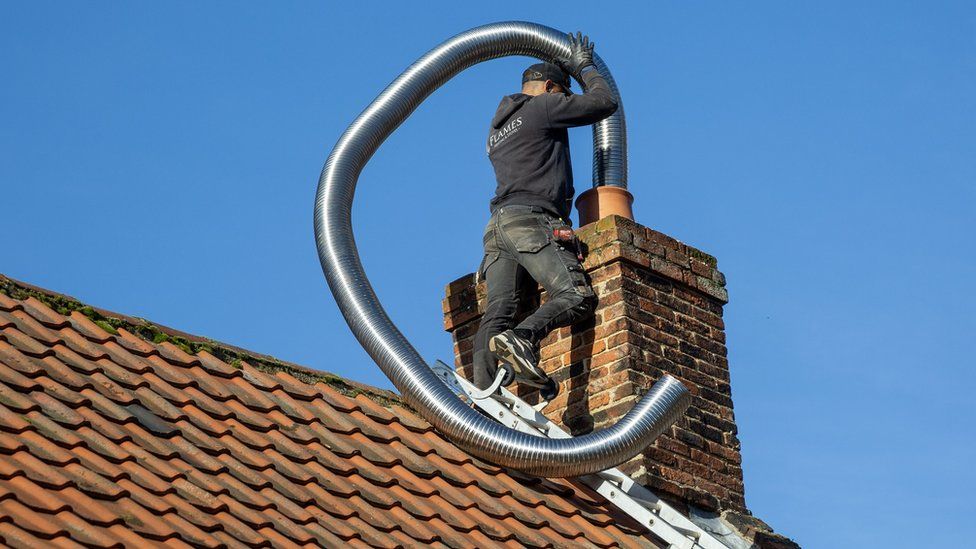ARTICLE AD BOX
 Image source, Getty Images
Image source, Getty Images
By Esme Stallard
Climate and science reporter, BBC News
The government will need to increase the sales of heat pumps dramatically if it is to achieve its annual targets, the spending watchdog has found.
To meet UK climate change targets, the government wants to install 600,000 low-carbon heat pumps annually by 2028.
The National Audit Office (NAO) said ministers were optimistic to think that target could be reached by then.
The government told the BBC it was "helping rather than forcing families to install heat pumps".
The NAO urged the government to increase public awareness of the green technology and work to reduce costs.
Its director Simon Bittlestone told the BBC: "The government has got some big questions to answer about how it plans to decarbonise home heating."
Heating in UK homes produces 18% of the country's greenhouse gas emissions, which are responsible for climate change.
Heat pumps use electricity rather than gas like boilers and, as the UK produces more electricity from renewable energy, fewer emissions will be created by heating our homes this way.
But despite the government's target, only 55,000 heat pumps were sold in the UK in 2022.
In its report, the NAO said that the main reasons for the low uptake are:
- limited public awareness of the technology
- the higher costs relative to gas boilers
- the lack of long-term financial support for households
The National Infrastructure Commission (NIC) estimates that air source heat pumps - the most common type for households - costs £10,000 more than a gas boiler on average.
But some energy companies are offering heat pumps as low as £500 with the government grant.
The government told the BBC it had already launched its Welcome Home to Energy Efficiency campaign, which provides information on heat pumps.
But Dr Richard Hauxwell-Baldwin, research and campaigns manager at industry body the MSC Foundation, said: "Information provision is not enough. It is an important first step, but we need consistency, clarity and certainty in the messaging."
He said that at the moment the government has not ruled out hydrogen as an alternative to heat pumps, and this means some gas engineers are recommending homeowners to wait before pursuing heat pumps.
The NAO also drew attention to the government's indecision on hydrogen heating. Last year it cancelled a number of trials designed to gather more information on the feasibility of the technology.
Industry representatives and local authorities told the NAO this uncertainty makes it difficult to invest in heat pumps, which would help to drive down prices for consumers.
The NAO has recommended the government makes a decision on whether hydrogen will be part of the UK's energy home heating system before 2026.
In response to the report, a Department for Energy Security and Net Zero spokesperson said the Boiler Upgrade Scheme - which offers grants for heat pumps - was helping families with the cost.
The grant was increased last year and applications grew by nearly 40% as a result. On Thursday, the government announced there will no longer be a mandatory requirement for insulation before applying for the grant.
Izzy Woolgar, director at Centre for Net Zero, an independent research unit within Octopus Energy, told the BBC: "It's common knowledge that the UK is falling behind Europe when it comes to decarbonising our homes."
But she welcomed the government's decision to remove the insulation requirement for the grant and said "it could make a big difference" for transferring the UK to heat pumps.
Last week, the government also announced that it is delaying by a year the implementation of fines for boiler manufacturers who do not hit heat pump sales targets.
Jess Ralston, energy analyst at research group the Energy and Climate Intelligence Unit (ECIU), said that this delay is another example of "dithering and U-turns by No 10" which has caused the delay in heat pump rollout.
She said the decision by the government, "only benefits the big boiler manufacturers and keeps the UK reliant on gas for longer".
Related Internet Links
The BBC is not responsible for the content of external sites.

 1 year ago
239
1 year ago
239








 English (US) ·
English (US) ·